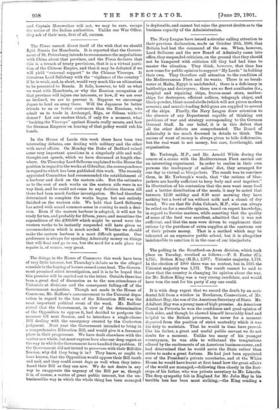The doings in the House of Commons this week have
been of very little interest, but Thursday's debate as to the alleged scandals in the buying of horses caused some heat. The Govern. ment promised strict investigation, and it is to be hoped that this promise will be carried out to the letter. Outside there has been a great deal of discussion as to the non-attendance of Unionists at divisions and the consequent falling-off of the Government majorities. Though not made in the House of Commons, Mr. Balfour's announcement to the Unionist depu- tation in regard to the fate of the Education BM was the most important political event of the week. Mr. Balfour stated that the Government, in view of the determination of the Opposition to oppose it, had decided to postpone the measure till next Session, and to introduce a single-clause Bill dealing with the emergency created by the Cockerton judgment. Next year the Government intended to bring in a comprehensive Education Bill, and would give it a foremost place in their programme. We have dealt elsewhere with the matter as a whole, but must express here also our deep regret at the way in which the Government have handled the problem. If the Government did not intend to persevere with their Bill this Ses3ion, why did they bring it in ? They knew, or ought to have known, that the Opposition would oppose their Bill tooth end nail, and they could count days as well when they intro- duced their Bill as they can now. We do not desire in any way to exaggerate the urgency of the Bill per se, though it is, of course, a matter of great public interest, but the un- businesslike way in which the whole thing has been managed is deplorable, and cannot but raise the gravest doubts as to the business capacity of the Administration.




















































 Previous page
Previous page